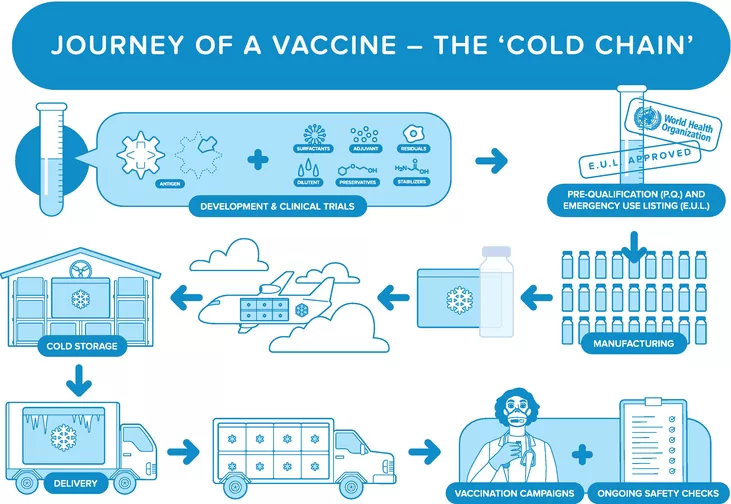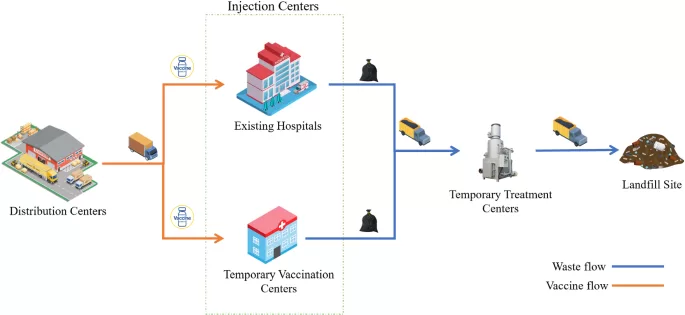
Explore the complex logistics of global vaccine distribution, from supply chain management to delivery challenges, ensuring equitable access to vaccines.
Introduction:
Vaccine logistics plays a crucial role in the global distribution of vaccines, making it one of the most critical logistics operations in modern history. With the ongoing challenges posed by pandemics, ensuring the swift and efficient delivery of vaccines has become a matter of life and death. This blog discusses the vaccine logistics involved in global vaccine distribution, the challenges faced, and the innovative solutions being implemented to overcome these hurdles. By understanding vaccine logistics, we can appreciate the importance of an effective supply chain in delivering life-saving vaccines to populations worldwide.
The Importance of Logistics in Vaccine Distribution

- Cold Chain Management
One of the primary challenges in global vaccine logistics is maintaining the integrity of the cold chain. Vaccines often require specific temperature ranges to remain effective. This necessitates a meticulously planned vaccine logistics system that includes temperature-controlled transportation and storage. For instance, the Pfizer-BioNTech vaccine requires storage at -70 degrees Celsius. This temperature must be maintained from the point of manufacture through to the final destination. Using advanced technologies, such as IoT sensors, logistics companies can monitor temperatures in real-time to ensure compliance. - Supply Chain Coordination
The logistics of vaccine distribution involve multiple stakeholders, including manufacturers, suppliers, healthcare providers, and governments. Coordinating these stakeholders is essential for a seamless supply chain. Effective communication systems are crucial to tracking inventory levels, forecasting demand, and managing shipping schedules. This coordination minimizes delays and ensures that vaccines are delivered to areas where they are most needed promptly. - Overcoming Geographic Challenges
Distributing vaccines globally often involves navigating various geographic and political landscapes. Some regions may be remote or difficult to access due to poor infrastructure or ongoing conflicts. Logistics companies must devise creative solutions, such as utilizing drones or other unconventional transport methods, to reach these underserved areas. For example, in rural Africa, drones have been successfully deployed to deliver vaccines, overcoming traditional transportation challenges. - Addressing Demand Fluctuations
The demand for vaccines can fluctuate significantly, influenced by factors such as outbreaks, public health initiatives, and seasonal variations. Logistics systems must be agile enough to respond to these changes. Forecasting models and data analytics play a vital role in predicting demand and optimizing inventory levels, ensuring that vaccines are available when and where they are needed. - Utilizing Technology for Efficiency
Technology plays a crucial role in enhancing the efficiency of vaccine distribution. From tracking shipments with RFID technology to utilizing blockchain for transparency in supply chains, innovative solutions are improving logistics operations. These technologies not only streamline processes but also help build trust among stakeholders by providing real-time visibility into the supply chain. - Compliance with Regulations
The vaccine distribution process is subject to strict regulatory standards to ensure safety and efficacy. Logistics companies must be well-versed in these regulations and implement compliant practices throughout their operations. This includes maintaining detailed records of temperature controls, shipment tracking, and delivery confirmations to demonstrate adherence to safety guidelines. - Community Engagement and Education
Beyond logistics, community engagement is essential to ensuring successful vaccine distribution. Education about the importance of vaccination and addressing vaccine hesitancy are crucial for achieving high vaccination rates. Logistics companies can collaborate with local health organizations to facilitate awareness campaigns, ensuring that communities are well-informed and prepared to receive vaccines.
Conclusion: The Future of Vaccine Logistics

The logistics of global vaccine distribution are a testament to human ingenuity and resilience. As the world faces ongoing health challenges, the importance of effective logistics cannot be overstated. By leveraging technology, enhancing coordination, and addressing geographic challenges, we can ensure equitable access to vaccines for all populations.
The successful distribution of vaccines relies on the collaboration of numerous stakeholders and innovative logistics solutions. As we move forward, it is vital to continue investing in these logistics systems to be better prepared for future public health crises.

